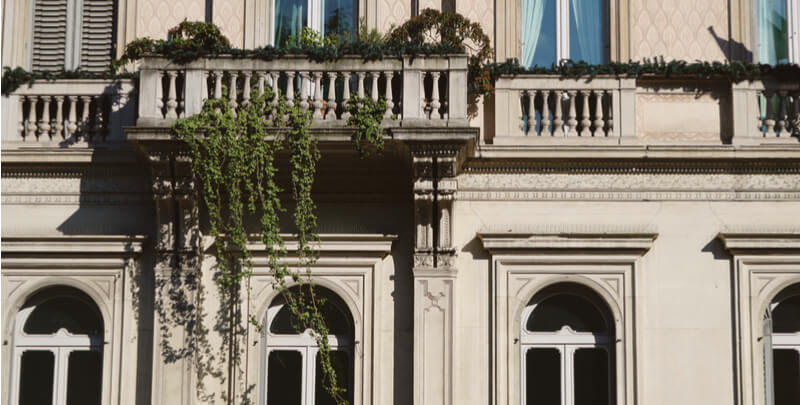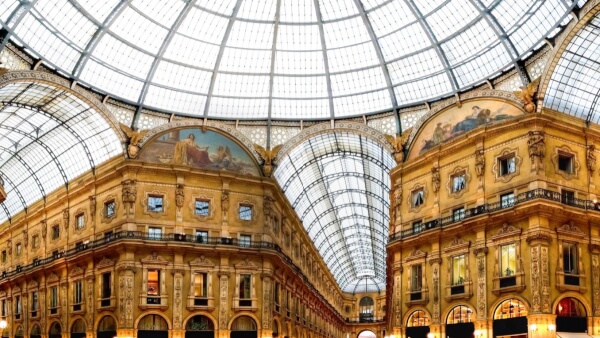Italy Golden Visa program: Full guide
Everything you need to know about getting a Golden Visa in Italy.

It might be Italy’s second city, but Milan is the heart of the country when it comes to finance and fashion. The large financial sector in particular means there are many expats in Milan, making for a vibrant and cosmopolitan city. There are also many international students, which means you'll find a very lively nightlife in some parts of the city. It’s a pretty active place, but being close to the Italian Lakes and the Alps means there’s always the opportunity to escape the city over the weekend.
Life in Milan is good for expats but unsurprisingly, it comes at a cost. A one bedroom apartment in the city centre will set you back around €1000 on average a month, excluding utilities, with a three bed place in the centre coming in at just over €2000. Overall, consumer prices in Milan come in slightly higher than in Rome, with rentals being on a par.
If you’re just making plans, it’s important to take into account all the costs associated with your move to Italy. Compare the cost of living in Milan with that of your home town using a comparison site such as Numbeo, and check out this quick guide to renting in Milan to find the perfect place for you.
Milan has a wide range of housing choices for expats, and where you end up will depend on your personal preference and budget. The city centre has a large stock of apartments, including some very luxurious lofts and penthouses, with price tags to match. For families and those seeking space, there are villas and single family homes, although these are far more common in the outer neighbourhoods. Accommodation isn’t cheap, so many people choose to look at the outer zones of the city, which still have strong public transportation connections to the centre.
You can find a mix of properties in Milan, including those described as unfurnished (vuoti), semi-furnished (parzialmente arredati) and completely furnished (arredati). An unfurnished place will most likely have no floor coverings, curtains or even light fixtures. You’ll find yourself needing to buy everything, including all the electrical appliances you need to make the home work for you.
Because picking up furnishings is expensive and time consuming, many expats choose a place which is at least partly furnished. A semi-furnished property should have functioning lights and appliances in the kitchen at the very least, while a furnished place will have all you need to move right in.
If you do choose an unfurnished property, check the small print in the contract. When you move out, your rental agreement might require you to return the property to an unfurnished state. That means you’ll have to pull up carpets, remove lights and repaint walls - or bear the cost of doing so.
If you’re only in Milan for a relatively short time, there are fully furnished short term rents available, although these tend to cost a lot more. Renting Milan, which specifically caters to the international market, has a number of shorter term rentals on offer, and clearly states the contract length on each ad, making it easy to navigate and narrow down.
Private rentals tend to be fairly expensive, so for students or those looking to find a cheaper deal, a flatshare might be a better option. Flat shares are more ‘one off’ individual arrangements. That means looking through your contacts and friends is a good start, in addition to joining Facebook groups specifically designed to connect prospective tenants with those looking to rent their room.
There are several different Facebook options, but whichever you choose, remember it's a small world. Landlords may post flat share offers in a handful of different groups. Being quick to respond, honest and straightforward in your dealings will reap the best results.
An alternative is to look for room rentals or student flat shares through your university, or using some of the helpful links over at the Study in Milan website.
Naturally, where you choose to rent in Milan will be largely dictated by the location of your job or university. Not to mention your budget. As you might expect, the further away from the heart of town you go, the more affordable the rents.
Milan is split into nine zones, with the historical centre of the city being Zone 1. The zones are administrative boroughs, and split down into smaller neighbourhoods. Each neighbourhood has its own vibe.
You can get more for your money if you’re prepared to have a bit of a journey into the city, but pretty much all of the zones outside the very centre have some ‘undesirable’ neighbourhoods which have issues with crime and poverty. Places including Ponte Lambro, Vigentino, Gratosoglio and Ronchetto sul Naviglio are generally more poor, and blighted to some extent by urban decay. It’s well worth doing your homework before you settle on a specific rental property to make sure the neighbourhood suits you.
The zones are named (in Italian) as follows:
The very centre of the city is extremely expensive, making it out of the reach of all but the most wealthy. It’s also worth remembering that the city centre gets full of tourists at peak season, which can be frustrating for residents.
However, Zone 3, which is still fairly central, has vibrant neighbourhoods and is especially popular with expats. Because of the university campuses in this area, there are lots of bars and clubs, and a very mixed population of locals and foreigners. Porta Venezia in Zone 3 is an incredibly diverse neighbourhood, popular with expats, where you can find people from all walks of life getting along together. Much of Zone 3 is pretty rowdy, so this tends to be an area for young professionals rather than families.
The embassies in Zone 4 mean that there’s plenty of accommodation on the upper end of the price range, especially in the neighbourhoods towards the inner city. The population of this zone is very mixed, with almost 19% of residents coming from outside of Italy. There are several large parks and green spaces for families to enjoy.
Further out of the centre, but still in Zone 4, the neighbourhood of Rogoredo is well connected to the city centre, making it a good balance of price and location. Alternatively, there is the former dormitory district of Quarto Oggiaro which is in Zone 8, and again offers reasonably priced rental properties with decent connections.
Isola in Zone 9, north of the centre is popular with those working in the Porta Nuova business district. It’s a well connected area, with a strong community spirit, but can get congested.
Expat families looking for a bigger property, and willing to have a longer commute, could even look outside the city to the towns of Monza and Brianza, which still have good public transportation links back into Milan. Monza, for example, is some 19 kilometers from the centre of Milan, but only about a 16 minute train ride. Commuting by car will take longer, however, due to the traffic.
Zone 3 is called Città Studi because of the large number of university and college campuses there. Not surprisingly, this is an area popular with international students, who can find reasonably priced homes and still easily get to class. However, if you’re looking for student accommodation, then your best bet might be to look for a company specialising in this form of housing, rather than on the open market. Ask your university for their advice on reputable agencies, or try the helpful Study in Milan website, which has ideas, rental ads and advice.
You'll find rental ads online and in classified advertisements in the local newspapers. Otherwise, you can call into one of the many rental agencies in the city for a face to face conversation with a realtor. As a starting point, try a good umbrella site for rentals all over the city to get a feel for the market:
In general most sites will allow you to search based on criteria of your choosing. It’s worth looking for a place with air conditioning, which isn’t standard, despite the hot summers. You might also see that ads have a cost per square meter, which allows you to compare similar places and get a feel for the cost in relation to the size.
It can feel daunting if you’re just setting about finding the right place in another country and culture. Here are some of the things that can help you be more prepared.
Even if you don’t speak any Italian yet, it can help to have a few words to hand when you’re trying to find your perfect rental in Milan. Many Italian rental sites don’t have any English at all, so having help from a local friend or a relocation specialist might give you an advantage. Otherwise, it’s time to brush up your language - here are a few terms you'll see:
To protect your interests, you should sign a contract before handing over any money or moving in. Make sure you understand what you’re agreeing to before you sign including details like clauses about terminating your agreement and notice periods. A standard notice period can be as long as six months. If you need to move out at short notice you could be hit by significant penalty charges, so make sure you know what you’ve agreed to.
For a contract to be valid, it should be registered with the local ufficio del registro. This will mean that you’re entitled to your full rights as a tenant, and your landlord can’t abruptly evict you. In fact, tenants rights are rigorously protected under Italian law, and a landlord wishing to take back his property normally has to give six months notice, and specify exactly why he wants to evict the tenant. Only certain reasons are deemed acceptable, and harsh penalties apply if the system is abused.There are two standard types of contract, a free market contract and a ‘convention’ contract. A free market contract is usually four years long, and the terms are agreed between landlord and tenant, while a convention contract tends to be three years, with an option to extend by a further two years.
When you’re agreeing a contract, if you’re going to be in an apartment block then make sure you know what the service charge (spese condominiali) will cost you. This can be a hefty amount and isn’t always added into the rental cost.
Good landlords are the majority, but in Milan, as in any other city, you’ll also find your share of unethical individuals or agents. Tenants rights are very well protected in Italy, as long as the contract process is followed properly. It’s worth having an Italian friend look over any tenancy agreement you’re given, if your language skills aren’t up to it, to make sure that there are no overly harsh penalty clauses.
There are also some properties in Milan which shouldn't be rented for residential purposes, according to the local regulations. If you find yourself in one of these, you might struggle to register your residency properly, so it’s worth having your agent do some due diligence checking. Ultimately, you need to trust your instinct with landlords. If something seems a bit off, or even too good to be true, then it probably is. Don't end up in a contract you’ll regret - it's far better to cut your losses and move on if you have concerns.
You’ll also find that most information about rentals, including adverts, is in Italian only. It can help to have an Italian speaking friend along with you when viewing flats to make sure you’re not overwhelmed with information, or muddled by the language barrier.
Don’t forget that many Milan apartments are rented out by word of mouth. If you're in Milan for work, then make sure your colleagues and local friends know you’re looking. You might find that they can hook you up with a place with a friendly landlord without incurring agent fees.
For a deposit, you can expect to be asked for up to three months worth of rent, on top of any realtor fees. You might also be asked for some rent up front to secure your tenancy. Occasionally, Italian landlords like to receive rent quarterly in advance, although it’s more common to work on a monthly basis. Any deposit you pay, should be returned to you at the end of the tenancy, less any damages, but often with interest added.
You’ll have to pay an agent fee in most cases, which might be up to a month’s rent. There’s also a local tax, known as Tassa di Registro, which is split usually between the landlord and tenant, and payable when the contract is registered.
If you’re still in the process of arranging your move to Italy, you might find that you need to make a deposit payment before you have opened a local bank account, or even arrived in the country. If you're already installed in your new place, but need to travel from time to time, you might also need to pay rent while you're abroad. If you do, it’s worth remembering that your home bank might not offer the best value when it comes to making an international money transfer. Often banks will add hidden fees by using a poor exchange rate, even with their own account holders.
Instead, try a specialist service like Wise to make your payment directly to your new landlord or agent, with no hidden costs and a fair exchange rate.
Be wary of common scams, such as properties offered for rent without proper contracts, or landlords or agents who ask for fees for a service you don’t want or need. However, the good news is that the rights of a tenant renting in Italy are well protected by law.
You might find that your landlord is unwilling to register the rental agreement - often because he does not want to declare the income for tax. However, without registering the agreement you don’t get your legal rights as a tenant, so you should make sure the proper process is followed.
Before you move in, it’s also worth reviewing the inventory and the condition of the property. Although your landlord is responsible for major repair works, he might not be willing to fix any issues which were immediately obvious before you signed the rental agreement. Get any work done before you move, as you’ll then become responsible for work needed for the day to day upkeep of the property. When it comes to the end of your tenancy, make sure you get an agreement about what portion of your deposit (if any) is withheld by your landlord. It’s not uncommon, for example, for a landlord to say they have to keep the deposit money to cover the cost of redecorating, which isn't allowed. Any ‘damage’ that's really just normal wear and tear, shouldn't be paid for out of the deposit.
Renting in Milan is fairly expensive compared to some other countries, but the expat experience makes up for the cost. It's a work hard, play hard place - just perfect for your experience living overseas. By casting your net wide, using your contacts well and being quick to make a decision on a place, you can have your dream Milan rental in no time. Good luck!
*Please see terms of use and product availability for your region or visit Wise fees and pricing for the most up to date pricing and fee information.
This publication is provided for general information purposes and does not constitute legal, tax or other professional advice from Wise Payments Limited or its subsidiaries and its affiliates, and it is not intended as a substitute for obtaining advice from a financial advisor or any other professional.
We make no representations, warranties or guarantees, whether expressed or implied, that the content in the publication is accurate, complete or up to date.

Everything you need to know about getting a Golden Visa in Italy.

Thinking about moving to Italy? Find out what you need to know about renting in Italy in this guide.

Get ready for la dolce vita with our guide on retiring in Italy.

Looking for jobs in Italy? Find all you need to know about Italian work visa requirements.

Here’s the lowdown on who can apply and how you go about getting dual citizenship with Italy.

Getting married in Italy is relatively straightforward. Like any wedding though, it requires advanced planning, as well as a basic understanding of the law....